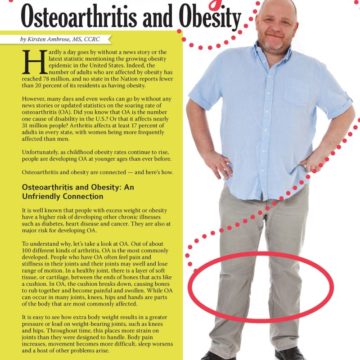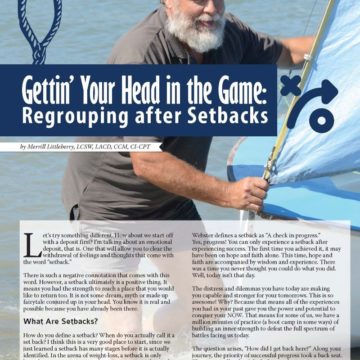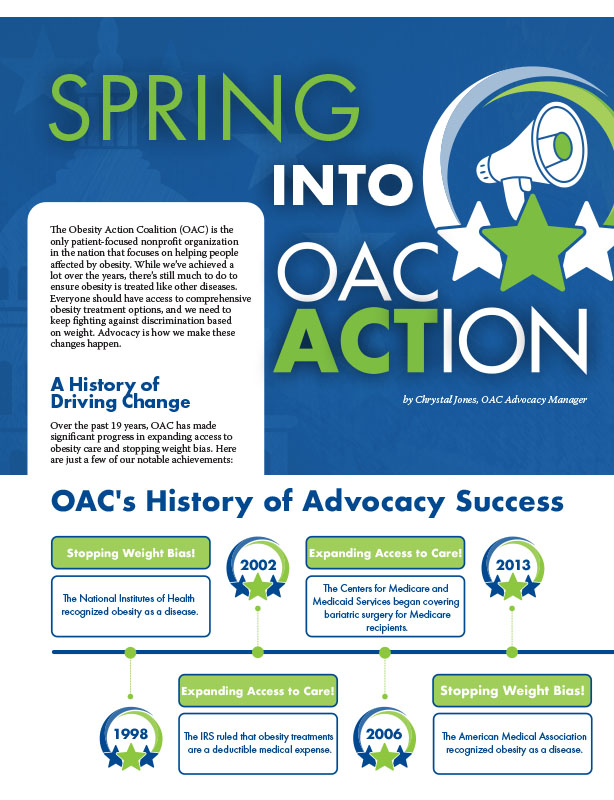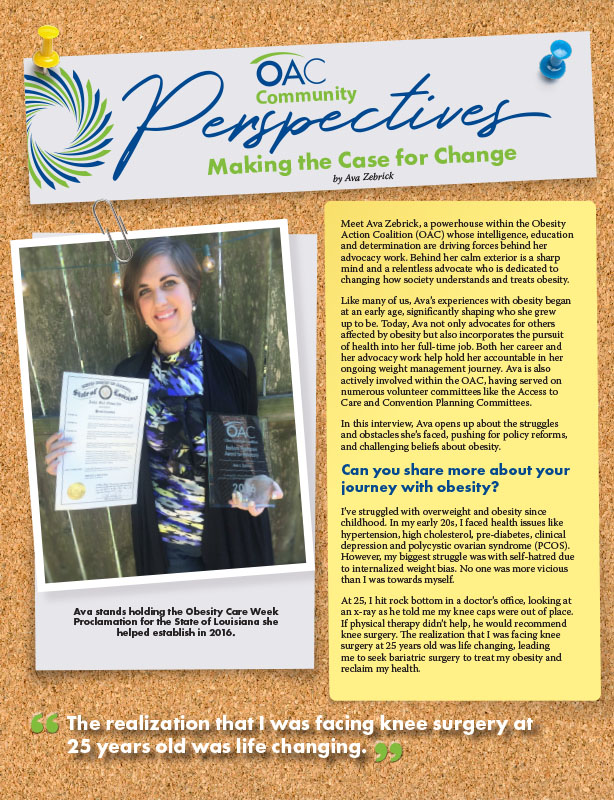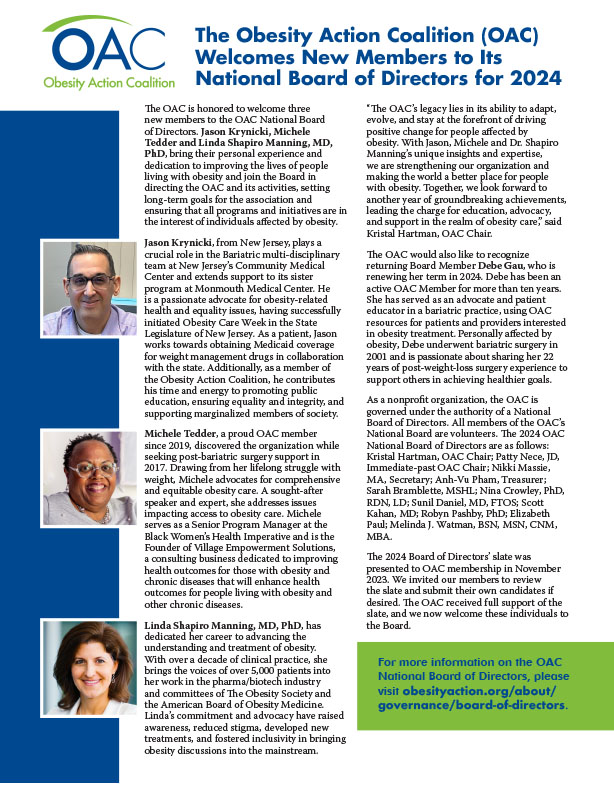5 YEARS STRONGER: THE OBESITY ACTION COALITION IN 2021

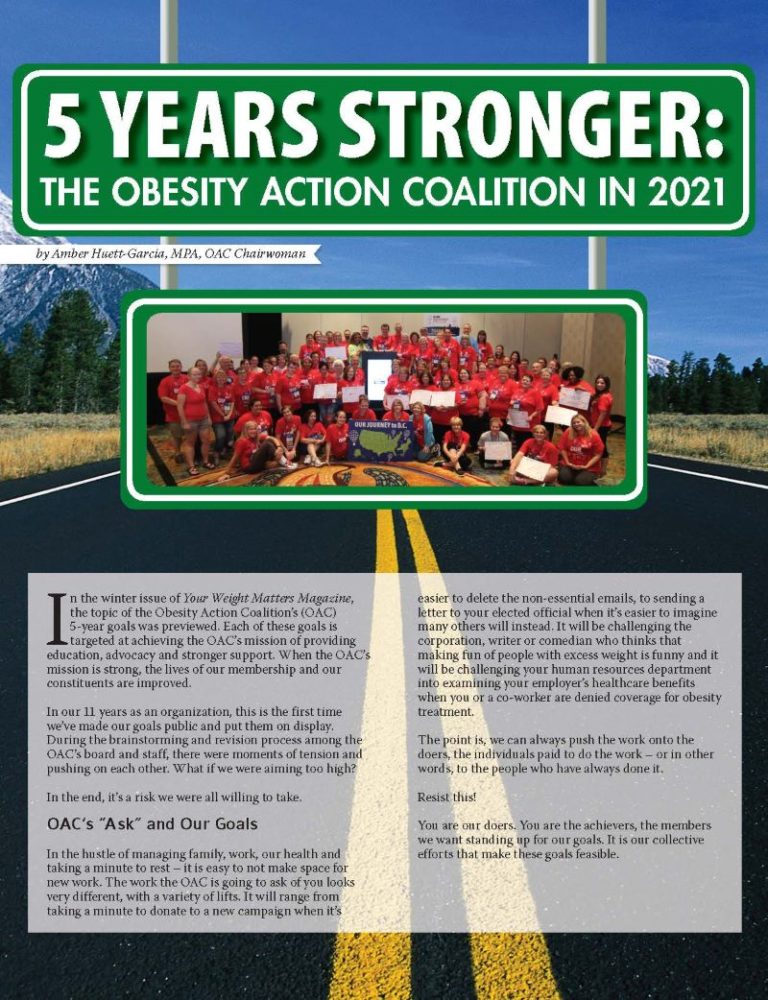
by Amber Huett-Garcia, MPA, OAC Chairwoman
Summer 2016
In the winter issue of Your Weight Matters Magazine, the topic of the Obesity Action Coalition’s (OAC) 5-year goals was previewed. Each of these goals is targeted at achieving the OAC’s mission of providing education, advocacy and stronger support. When the OAC’s mission is strong, the lives of our membership and our constituents are improved.
In our 11 years as an organization, this is the first time we’ve made our goals public and put them on display. During the brainstorming and revision process among the OAC’s board and staff, there were moments of tension and pushing on each other. What if we were aiming too high?
In the end, it’s a risk we were all willing to take.
OAC’s “Ask” and Our Goals
In the hustle of managing family, work, our health and taking a minute to rest – it is easy to not make space for new work. The work the OAC is going to ask of you looks very different, with a variety of lifts. It will range from taking a minute to donate to a new campaign when it’s easier to delete the non-essential emails, to sending a letter to your elected official when it’s easier to imagine many others will instead. It will be challenging the corporation, writer or comedian who thinks that making fun of people with excess weight is funny and it will be challenging your human resources department into examining your employer’s healthcare benefits when you or a co-worker are denied coverage for obesity treatment.
The point is, we can always push the work onto the doers, the individuals paid to do the work – or in other words, to the people who have always done it.
Resist this!
You are our doers. You are the achievers, the members we want standing up for our goals. It is our collective efforts that make these goals feasible.
Let’s break it down. What are the OAC’s 5 year goals?
1. Access: By 2021, the OAC will have secured universal coverage for comprehensive obesity treatment services for all who wish to receive them. With this goal achieved, the only barrier that would exist in 2021 for treatment of excess weight is one’s own decision-making – not a lack of healthcare insurance.
2. Funding: By 2021, the OAC will have a robust and diverse fundraising structure to adequately support our growing programs and services and allow for the creation of a reserve fund. We will have enough money to reach our goals, and in those leaner years, we will have enough in the bank to not close up shop.
3. Weight Bias: By 2021, the OAC will continue to actively combat weight bias and strive to reduce its impact on those affected by obesity, specifically with the goal of reducing the fat phobia, blame and social rejection scales by at least 10 percent. By achieving this, more people will understand obesity and speak up when obesity is portrayed as something to blame and shame.
4. Education: By 2021, the OAC will be recognized as the authority for unbiased and clear patient education focused on improving the health of those affected by obesity. You and everyone else will trust the OAC as the premiere organization for obesity and weight education. Period.
5. Visibility: By 2021, the OAC will increase both its visibility and brand recognition by doubling 2016 levels of recognition within our core target audiences and the general public. By 2021, twice as many people reading this now will know who we are in 2021 – both prompted and unprompted.
6. Support: By 2021, the OAC will have built the infrastructure, initiatives and programs to actively engage our supporters and volunteers in an active, vibrant community, whether online or in person at the local, state and National levels. We will engage and recruit members in new ways and we have enough staff and resources to do it well.
Getting involved
These six goals alone are just that – goals. In order to ensure the OAC is on track, the board and staff felt it was important to create benchmarks for achieving success.
Take a look at the benchmarks below – cut it out and put it on the refrigerator, put it on your vision board, stick it in your weekly planners and ask yourself: “What part can I play in moving these forward?”
In ACCESS the OAC will…
- Advocate for evidence-based behavioral, mental, medical, pharmaceutical and surgical treatment for obesity.
- Create a state and Federal advocacy network to ensure access to care and reasonable reimbursement in both public and private insurance.
- Ensure that all 50 states have coverage under Medicare and Medicaid.
- Eliminate non-evidence-based requirements that insurers use to prevent or limit treatment.
In FUNDING the OAC will…
- Increase the number of Annual donors from 1 percent to 10 percent of its supporter database.
- Acquire five new high level donors from a diverse range of organizations, foundations and companies.
- Sustain OAC’s base operating expenses on membership revenue.
- Create a reserve equal to 1 year of base operating expenses.
- The OAC will grow its yearly revenue to $5 million by 2021.
In WEIGHT BIAS the OAC will…
- Develop weight bias educational programs, centered on the goal to educate the public about weight bias and its consequences.
- Develop Nationwide weight bias awareness and response campaigns to help our membership and the public increase awareness in recognizing weight bias and decreasing the incidence of it in all sectors.
- Create an activation strategy that mobilizes at least 15 percent of our supporters to take on issues of weight bias.
In EDUCATION the OAC will…
- Expand its educational offerings to include information for under-represented populations, along with related disease states.
- Increase its distribution of educational resources to 5 million pieces annually by 2021.
- Create partnerships with key medical associations to distribute OAC educational resources to all major medical providers, with the goal to reach 2 million of their patients annually.
- Expand mediums used to deliver education (webinars, videos, social media, etc.).
In VISIBILITY the OAC will…
- Increase organizational and cause-focused visibility through improved SEO rankings.
- Leverage www.ObesityAction.org to be within the top hit Web sites for obesity searches.
In COMMUNITY ENGAGEMENT the OAC will…
- Create a state chapter network to organize individuals in their local communities.
- Create platforms, in-person and virtual, to engage OAC supporters in conversations.
- Diversify the OAC’s membership/supporter base to expand underrepresented groups in three areas:
- Increase male supporters by 25 percent
- Increase support/involvement from supporters of racial/ethnic groups by 25 percent
- Balance geographic regions
- Sponsor the development of international affiliates.
Showing up as a Doer
Similar to any big commitments for change, it may feel difficult to know where to start. One quote that personally reminds me of this task is one that I’ve always looked at when I’m making changes to my health or a routine I’m no longer getting energy from: “It is not enough to take steps which may someday lead to a goal; each step must be itself a goal and a step likewise.” (Goethe).
Showing up for these goals will require vulnerability, courage, time and energy, and it will look different for each of you, which is why we need all of you!
Contributing to our goals can look like whispering to a co-worker “that felt biased and I think an apology is in order,” after you hear an offensive joke.
Advancing our goals might be you at a town hall with an elected official who is glazing over obesity problems in your community, and you take the podium to say “I’m your constituent and I know this is a real problem. Let me tell you why.”
It might be activating and standing alongside on your connections in your everyday lives, such as a friend who works in a corporation who wants to spread wellness materials to their employees or start an employee giving campaign, a relative who works for a major insurance company and wants to improve health outcomes or someone you know who wants to contribute to a fundraising quarterly call-to-action.
Sometimes, courage in standing up as a doer may come out less polished. I’m guilty of this, and in rooms where I’m surrounded by friends, and not foes. It’s a product of wanting things to be different than they are and starting your change with the frustration.
In the OAC January board of directors’ retreat, we discussed our membership structure, specifically cost; I was among a small group of board members who said that the 10 to 20 dollars held people back from joining the OAC.
Inside my heart and head, I hold a different lived experience than that of my colleagues. My proximity both personally and relationally to poverty is high. My more mature and refined side would have calmly said: “I’ve seen families and individuals make the decision between needs and an OAC membership doesn’t qualify as a need. Or, I might have said “I live in Memphis, and its ranked third in poverty when you look at populations over 500,000, including more than 45 percent of the city’s children.” Instead, in my most annoyed, ugly voice I said “If we think that ten to twenty dollars isn’t a barrier to families – this is ridiculous!”
This is not the doer I’m asking you to be. The point is that sometimes standing up as a doer means first getting mad. Practice your story. What’s moving you to get involved? Start with what you know best – your own experience — and be transparent with why you’re showing up. Together, we will make the next five years of the Obesity Action Coalition the best yet.
About the Author:
Amber Huett-Garcia, MPA, is a long-time member and chairwoman of the OAC National Board of Directors and a bariatric surgery patient. She is a director with Teach For America – Memphis. Amber holds a Master’s of Public Administration from the University of Illinois – Springfield and is a graduate of Bradley University in Peoria, Ill. She resides with her husband, Matt, and daughter, Parker, in Memphis, Tenn.
by Chrystal Jones, OAC Advocacy Manager Spring 2024 The Obesity Action Coalition (OAC) is the only patient-focused…
Read Articleby Ava Zebrick Spring 2024 Meet Ava Zebrick, a powerhouse within the Obesity Action Coalition (OAC) whose…
Read ArticleThe OAC is honored to welcome three new members to the OAC National Board of Directors. Jason Krynicki,…
Read Article




